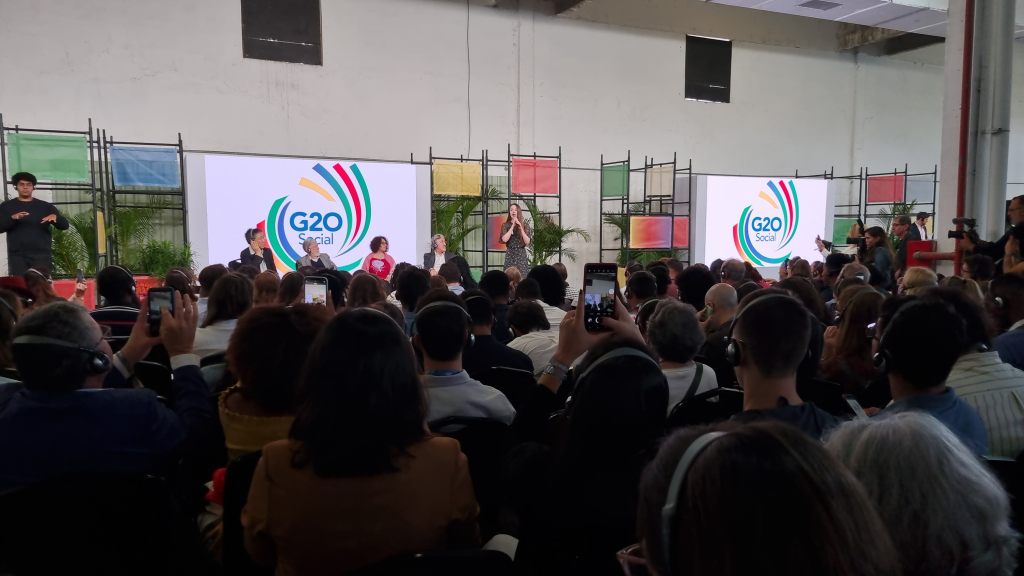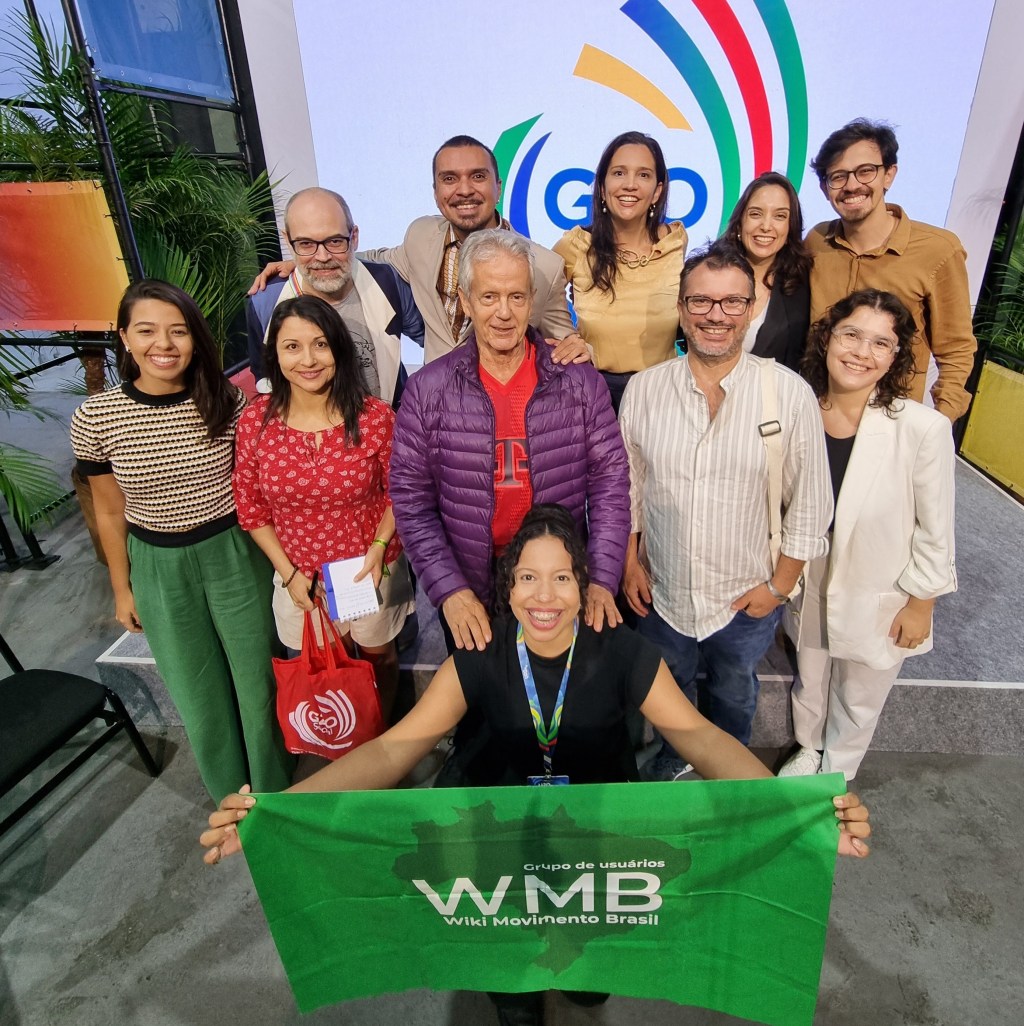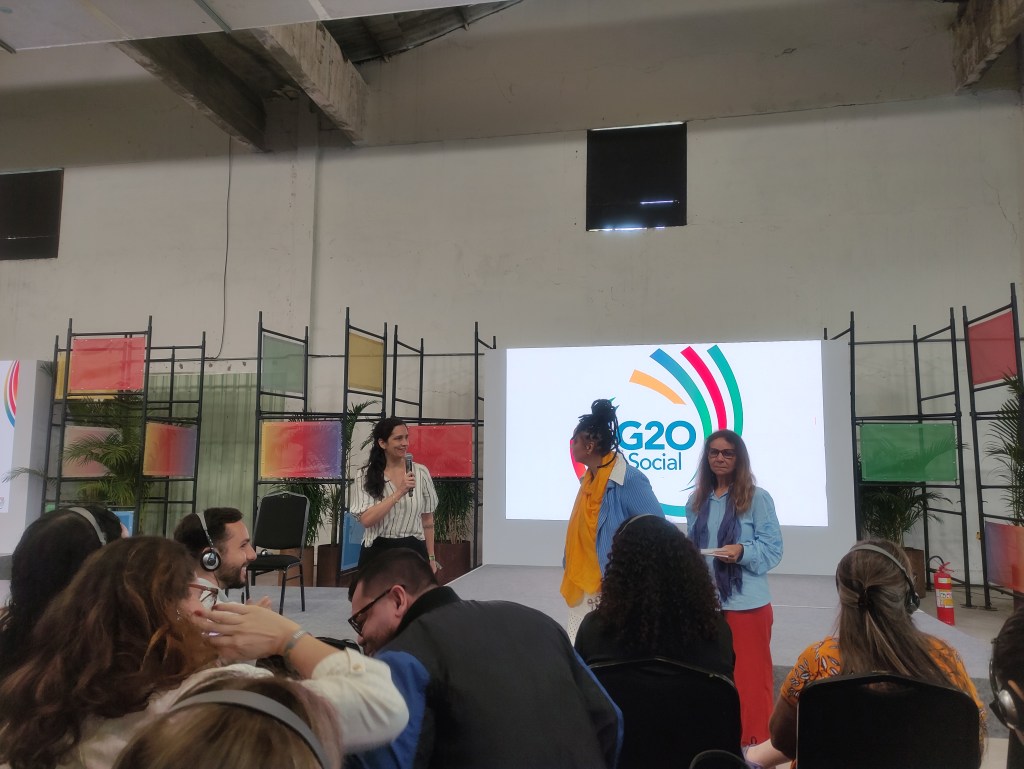How the Wikimedia Movement contributed to shaping internet governance recommendations for G20
The defense of a free, democratic, and plural internet, which protects public interest projects and digital public goods, was promoted at the G20 Social thanks to the panel “Reforming Global Governance: The Global Digital Compact in the Context of Free Internet.” Organized by Wiki Movimento Brasil, the panel was held in partnership with Agência Lupa, Idec (Consumer Defense Institute), and data_labe. On the second day of the Summit, Wiki Movimento Brasil was also actively engaged in the Social Participation Plenary, which resulted in concrete recommendations for the final declaration, delivered to the G20 leaders..

The debate panel was one of 250 self-managed activities (initially 270, but some were merged due to related topics) that, according to the organizers, brought together nearly 20,000 accredited participants between November 14 and 15 in Rio de Janeiro. The event featured seminars, meetings, and various debates, mobilizing individuals interested in proposing public policies to the leaders of the 19 most powerful economies on the planet, plus the European Union and the African Union.
Among the discussions held by over 1,300 civil society organizations, social movements, engagement groups, national and international bodies, universities, government agencies, and technical organizations, approximately 40% of the activities addressed sustainability, climate change, and just energy transition; 39% dealt with ways to combat hunger and inequalities; and 20% debated global governance.
In this context, the panel “Reforming Global Governance: The Global Digital Compact in the Context of Free Internet” sought to promote dialogue among different actors in the digital environment to broaden the reflection on the Global Digital Compact, proposing a view of digital governance beyond the big techs and aiming to explore pathways for a more collaborative and diverse internet. Signed by United Nations member states in September this year during the Summit of the Future, the Global Digital Compact established a shared commitment among the signatories regarding the use of technology, and now needs to be locally operationalized.
“We consider it very positive that the pact highlights the multiple models of digital public goods and infrastructure, such as free software, open data standards, and open content, identified as key drivers of a more inclusive digital transformation. The challenge now is to implement the recommendations and ensure that commitments translate into concrete actions,” emphasized Marília Rocha, Communication Manager at WMB.
During the debate panel, she presented the Wikimedia Movement campaign, endorsed by dozens of affiliates and other organizations worldwide, which proposed the incorporation of three principles into the text of the Global Digital Compact. Partly thanks to this campaign and other mobilizations, the final text acknowledges that digital public goods empower societies to address their needs through digital technologies and can expand social and economic opportunities for all. Recognizing the need to increase investments in developing such infrastructures, the Pact’s signatories commit to:
– Develop, disseminate and maintain, through multi-stakeholder cooperation, safe and secure open-source software, open data, open artificial intelligence models and open standards that benefit society as a whole;
– Promote the adoption of open standards and interoperability to facilitate the use of digital public goods across different platforms and systems;
– Develop and decide on a set of safeguards for inclusive, responsible, safe, secure and user-centered digital public infrastructure;
– Exchange and make publicly available best practices and use cases of digital public infrastructure to inform Governments, the private sector, and other stakeholders, building on existing United Nations and other repositories;
– Encourage the formation of partnerships that bring together Governments, the private sector, civil society, technical and academic communities, and international and regional organizations to design, launch, and support initiatives that leverage digital public goods and digital public infrastructure to advance solutions for the Sustainable Development Goals.
In total, the Global Digital Compact outlines five objectives and over 60 commitments, including advocating for cooperation among diverse entities to prevent, identify, and address risks of internet fragmentation while promoting a safe, reliable, interoperable, global, and open online environment. To safeguard information integrity and combat the spread of hate speech online, the signatories also committed to fostering diverse and resilient information ecosystems, promoting media and information literacy, and encouraging social media platforms and digital technology companies to adopt transparency and accountability measures in their systems, including content moderation, user data usage, and algorithms.
“We must strive for the successful implementation of the GDC, which requires collective reflection on the most effective paths to building a truly safer and more open digital future in each territory. These are critical issues for Society as a whole, and we cannot afford to be left out of this process,” Marília emphasized.
Panel Participants share Recommendations

Highlighting the importance of protecting the rights of all individuals in the digital environment, Camila Leite, Coordinator of the Telecommunications and Digital Rights Program at Idec (Consumer Defense Institute), addressed the connections between the Global Digital Compact and the 20 recommendations of the Civil20 (C20) working group. “We need to understand the intersections in discussions about technology and find points of convergence, always ensuring balanced participation,” she stated. “For these discussions to have legitimacy, they cannot happen exclusively among governments. Civil society participation must be encouraged, considering its access challenges.”
The C20 was officially established as an engagement group of the G20 in 2013. Since then, it has been composed of civil society organizations that focus on discussing social, humanitarian, and sustainable development issues. On November 13, the Brazilian chapter of the group delivered a Policy Pack, a set of strategic policy recommendations covering four priority areas: Information integrity; Meaningful connectivity; Digital Government (and Digital Public Infrastructures – DPIs); Artificial intelligence (AI).
The section on information integrity emphasized actions to combat disinformation, regulate digital markets, and promote responsibility and transparency among digital platforms. For digital government, the recommendations included mechanisms for social participation and institutional trust, empowering people to seek redress when their human rights are not upheld or public resources are misused in digital public infrastructures. On meaningful connectivity, the group highlighted the need to ensure universal access to devices for public education, develop international programs to address infrastructure gaps, and guarantee access to connectivity for all.
This issue was central to the presentation by Paulo Polinho, Data Coordinator at data_labe, a laboratory that democratizes knowledge through data analysis and dissemination, focusing on race, gender, and territory from the Maré Complex in Rio de Janeiro. He pointed out that many people experience low-quality connectivity, lacking adequate devices or satisfactory speeds, and stressed the need to ensure the social, educational, and economic benefits of high-quality connectivity for everyone.
“We have a population that is already being left behind, and the Global Digital Compact does not mention them or effectively address race. Policies that are not designed with a racial perspective will exacerbate oppression,” Paulo emphasized. “We need to think locally and regionally to move toward a fairer and more equitable pact that reaches neighborhoods and communities. Social engagement can help fix this system.”
Representing the education team at Lupa, a platform combating disinformation through fact-checking and media literacy, Victor Terra shared a series of initiatives to promote information integrity, and Lupa’s academic repository for scientific dissemination, “Achado.”
“We aim to reach different audiences through diverse approaches, considering the importance of communicating from a local perspective and tailoring content, formats, and topics to facilitate effective dialogue with people. We do this with the purpose of building a truly healthier and more democratic internet,” he said. “The panel provided significant contributions by offering both technical perspectives and practical applications of these reflections. We’re bringing social demands, listening to citizens interested in the topic, and formulating suggestions for country leaders to consider in their decision-making.”
Among those who attended the debate, Salete Martins, a student and researcher from UFSC (Federal University of Santa Catarina), underscored the need to reflect on the role of technology in society. “Technology plays a fundamental role and often interferes with people’s lives, work, and daily routines in ways that are not always positive. It’s not about rejecting technology but questioning ‘for what,’ ‘for whom,’ and ‘why’ it’s being used in this way,” she reflected. “I want to thank you for this wonderful opportunity for reflection. It’s crucial to go beyond mere technological use, beyond technical aspects, and critically question how technology serves the interests of the population from an emancipatory perspective of digital culture.”
Luiza Franco Machado, a digital rights activist and UN Youth Leader for the Sustainable Development Goals (SDGs), added: “I was deeply inspired by this panel, learning about civil society initiatives that integrate digital rights and data governance into the Brazilian context. We need to consider how to bring more people into this essential debate,” she noted. “Our responsibility is to encourage everyone to get involved and understand how digital governance affects our private and public lives. Including the youth perspective is critical—we need to be in these spaces, demanding our rights and ensuring this becomes a national, regional, and global movement.”
WMB Contributes at Social Participation Plenary

On November 15, participants had the opportunity to choose one of the three thematic axes of the Participatory G20 plenary sessions to propose modifications, additions, or comments to the final version of the G20 Social Summit declaration. The document, approved and delivered to the Presidency of the Republic on November 16, synthesizes the consensus reached by participants throughout the participatory process. It was regarded as a historic achievement in the G20’s, symbolizing citizen participation in the formulation of public policies.
The process involved online voting and contributions throughout the year, culminating in in-person discussions during the Summit. Based on the draft text, participants could register to present proposals. The Wiki Movimento Brasil contributed to the Global Governance Reform axis, advocating for the promotion of public interest projects and digital public infrastructures, such as open-source software, to enhance opportunities for meaningful social participation.
“We must commit to scaling models of digital public goods that not only ensure access to free knowledge but also drive inclusive social transformation, channeling technological development toward the common good,” emphasized WMB’s Communication Manager.
Ronald Ferreira, General Coordinator for Participation Articulation at the National Secretariat for Social Participation, highlighted the contributions of various movements to shaping key ideas for addressing global challenges. “We received outstanding contributions emphasizing the need to incorporate participatory democracy into the global governance agenda, along with tools and mechanisms that enhance social participation, including free environments and access to information,” he said. “We are working toward enabling society to participate effectively in decision-making processes, transforming consensus among diverse sectors into political capacity to influence and change the course of events.”


Can you help us translate this article?
In order for this article to reach as many people as possible we would like your help. Can you translate this article to get the message out?
Start translation